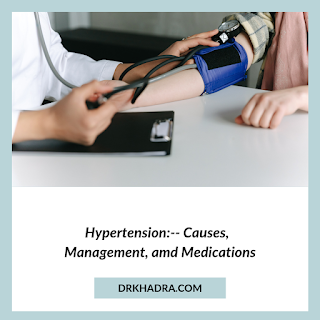Introduction
Hypertension, which is often referred to as high blood pressure, is a long-lasting health issue characterized by increased force within the blood vessels. This condition forces the heart to work harder to pump blood throughout the body, which, if left uncontrolled, can lead to severe health issues such as heart disease, stroke, or damage to vital organs.
It is diagnosed when blood pressure readings are consistently above 130/80 millimeters of mercury (mm Hg).
It can damage blood vessels and organs throughout the body, including the heart, brain, kidneys, and eyes.
Understanding the causes, risk factors, and management of hypertension is crucial for maintaining overall well-being and preventing associated complications.
Why is it important?
Prevalence and risk factors
Pathophysiology
Types
It can be categorized into two primary forms. The first is known as Primary Hypertension or Essential Hypertension, which is the most widespread kind and lacks a clearly identifiable cause.
Secondary hypertension is caused by an underlying medical condition, such as kidney disease, heart disease, or endocrine disorders.
Causes
Hypertension, or high blood pressure, can have various underlying causes. In simpler terms, these causes include:
•Unhealthy Lifestyle: Consuming a high-sodium diet, lack of physical activity, excessive alcohol intake, and smoking can raise blood pressure.
•Genetics: Family history plays a role, as hypertension can run in families.
•Obesity: Being overweight can strain the heart and increase blood pressure.
•Stress: Persistent stress can cause a temporary increase in blood pressure.
•Age: As people get older, their blood pressure often increases.
•Medical Conditions: Conditions like kidney disease, diabetes, and hormonal disorders can contribute to hypertension.
•Medications: Certain medications, such as birth control pills or decongestants, can cause temporary increases in blood pressure.
•Sleep Apnea: Interrupted breathing during sleep can lead to high blood pressure
•Chronic Conditions: Conditions like high cholesterol and atherosclerosis can contribute to hypertension.
•Diet: A diet high in processed foods, sugars, and saturated fats can contribute to hypertension.
Syptoms
In the beginning, high blood pressure frequently shows no signs. This is why it is important to have regular blood pressure checks.
When symptoms do occur, they may include:
● Headache
● Nosebleeds
● Fatigue
● Shortness of breath
● Chest pain
● Palpitations
● Blood in the urine
● Vision changes
Management
Managing hypertension, also known as high blood pressure, is essential for ensuring your overall well-being. Here are some important actions you can take:
•Regular Blood Pressure Monitoring: Begin by checking your blood pressure regularly. You can use a home blood pressure monitor or visit your healthcare provider for this. Keeping track of these numbers is important to understand your current status.
Healthy Lifestyle Choices:
•Diet: Follow a heart-healthy diet that includes plenty of fruits, vegetables, whole grains, and low-fat dairy products. Reduce your salt intake and minimize processed food consumption.
•Exercise: Incorporate regular physical activity into your routine, aiming for at least 150 minutes of moderate-intensity exercise per week.
•Weight Management: Maintain a healthy weight or work on shedding extra pounds if necessary.
•Quit Smoking: If you smoke, quitting is highly beneficial for your blood pressure and overall well-being.
•Medications: If lifestyle changes alone aren't enough to manage your blood pressure, your doctor may prescribe medication. Make sure to take your medication as directed and attend regular check-ups to monitor your progress.
•Stress Management: Practice techniques like deep breathing, meditation, or yoga to reduce stress. Persistent stress can contribute to elevated blood pressure
•Regular Medical Check-ups: Keep up with routine visits to your healthcare provider to monitor your blood pressure and discuss any concerns or adjustments to your treatment plan.
•Dietary Approaches: Consider adopting the DASH (Dietary Approaches to Stop Hypertension) eating plan, which emphasizes fruits, vegetables, lean proteins, and whole grains. This can be particularly effective in managing blood pressure.
•Limit Caffeine: Be mindful of your caffeine intake, as excessive caffeine consumption can temporarily raise blood pressure.
•Stay Informed: Educate yourself about hypertension and its risks. Knowing how high blood pressure affects your body can be motivating in managing it.
•Community and Support: Share your journey with friends or family. They can provide support and encouragement, making it easier to stick to your healthy lifestyle changes.
•Medication Compliance: If you're prescribed medication, take it as directed by your healthcare provider. Don't skip doses or stop taking them without discussing it with your doctor.
Remember, it often doesn't cause noticeable symptoms, so regular check-ups and a proactive approach to managing it are essential for your long-term health. It's important to seek advice and guidance from a medical expert for personalized recommendations.
Medications
Common medications used to treat hypertension in simple terms:
•Angiotensin-Converting Enzyme (ACE) Inhibitors: These help blood vessels relax, making it easier for blood to flow.
•Angiotensin II Receptor Blockers (ARBs): These also relax blood vessels and lower blood pressure by blocking a specific hormone.
•Beta Blockers: They slow down the heart rate and reduce the workload on the heart.
•Calcium Channel Blockers (CCBs): These relax and widen the blood vessels, improving blood flow.
•Diuretics ("Water Pills"): Help your body get rid of excess salt and water to reduce blood volume and pressure.
•Alpha Blockers: They reduce nerve impulses to blood vessels, allowing blood to flow more easily.
•Vasodilators: These medications directly open (dilate) the blood vessels, making it easier for blood to flow.
Complications
If it is not treated, it can lead to serious complications, such as:
● Heart attack
● Stroke
● Heart failure
● Kidney disease
● Aneurysm
● Vision loss


Post a Comment